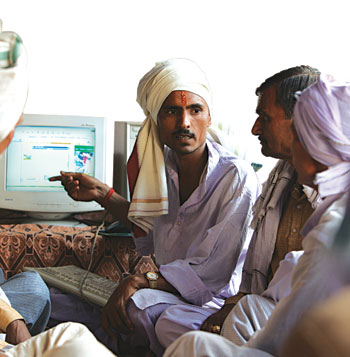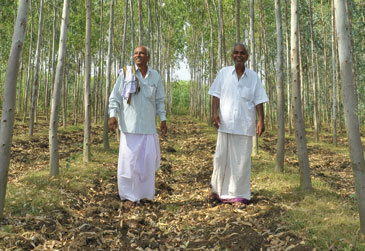e-Choupal: a Path-breaking Tool
that Knowledge-enables the Farmer
 ITC’s e-Choupal revolutionised the Indian agricultural landscape by leveraging digital technology and customised extension services to empower farmers and raise rural incomes. By providing the power of Information and Digital Technology as well as the Internet, small and marginal farmers are empowered with a host of services related to know-how, best practices, timely and relevant weather information, transparent discovery of prices and much more. The e-Choupal network not only connects farmers to markets but also allows for a virtual integration of the supply chain to create significant efficiencies in the traditional system. ITC’s e-Choupal revolutionised the Indian agricultural landscape by leveraging digital technology and customised extension services to empower farmers and raise rural incomes. By providing the power of Information and Digital Technology as well as the Internet, small and marginal farmers are empowered with a host of services related to know-how, best practices, timely and relevant weather information, transparent discovery of prices and much more. The e-Choupal network not only connects farmers to markets but also allows for a virtual integration of the supply chain to create significant efficiencies in the traditional system.
A business concept embedded with social goals, e-Choupal has been designed to benefit farmers by enabling a virtuous cycle of higher productivity, higher incomes, enlarged capacity for farmer risk management, and thereby larger investments to enable higher quality and productivity. Given the productivity challenges and the new threats emerging from global warming, ITC’s e-Choupal is extensively engaging with farmers to promote sustainable agricultural practices through a dedicated initiative titled the ‘Choupal Pradarshan Khet’. This customised extension service is aimed at bringing the benefits of agricultural best practices to small and marginal farmers.
ITC’s e-Choupal network also serves as an effective rural marketing platform and together with other channels established by ITC in rural markets, the network reaches remote villages in rural India. In recognition of the changing needs of rural India, new partnerships are being forged under the e-Choupal framework to help support micro-enterprises as also new off-farm opportunities through a recently created virtual rural employment platform available at “rozgarduniya.com”. These innovations will continue to add value to the rural population as India takes the next leap into the future.
Wasteland Development:
Social Forestry
 A total of 2082 hectares were brought under social forestry plantations during the year. 933 hectares of timber were felled by 1,174 beneficiaries during the year, yielding 19,996 tonnes of debarked wood. The poor tribal farmers who reaped the benefits of the social forestry programme, earned Rs. 3.60 crore at an average of Rs. 31,000 per farmer. The total village development fund increased to Rs. 94 lakh.
The social forestry programme has created sustainable livelihood opportunities for 19,376 poor households to date by transforming 16,442 hectares of land into productive plantations.
In addition, it has augmented the raw material base for ITC’s Paperboards business, besides contributing to large scale carbon sequestration. A part of the total acreage covered under this programme was registered as a CDM project, the first of its kind in India. A total of 2082 hectares were brought under social forestry plantations during the year. 933 hectares of timber were felled by 1,174 beneficiaries during the year, yielding 19,996 tonnes of debarked wood. The poor tribal farmers who reaped the benefits of the social forestry programme, earned Rs. 3.60 crore at an average of Rs. 31,000 per farmer. The total village development fund increased to Rs. 94 lakh.
The social forestry programme has created sustainable livelihood opportunities for 19,376 poor households to date by transforming 16,442 hectares of land into productive plantations.
In addition, it has augmented the raw material base for ITC’s Paperboards business, besides contributing to large scale carbon sequestration. A part of the total acreage covered under this programme was registered as a CDM project, the first of its kind in India.
|
|